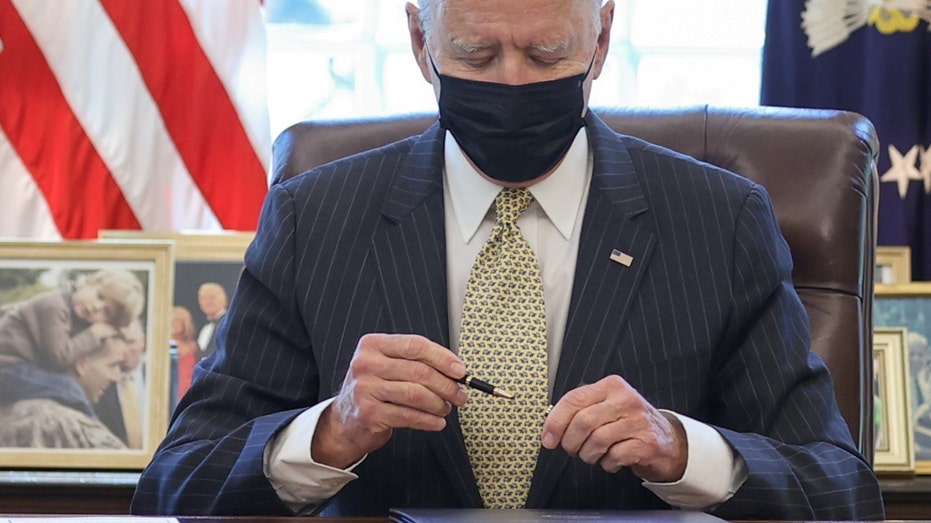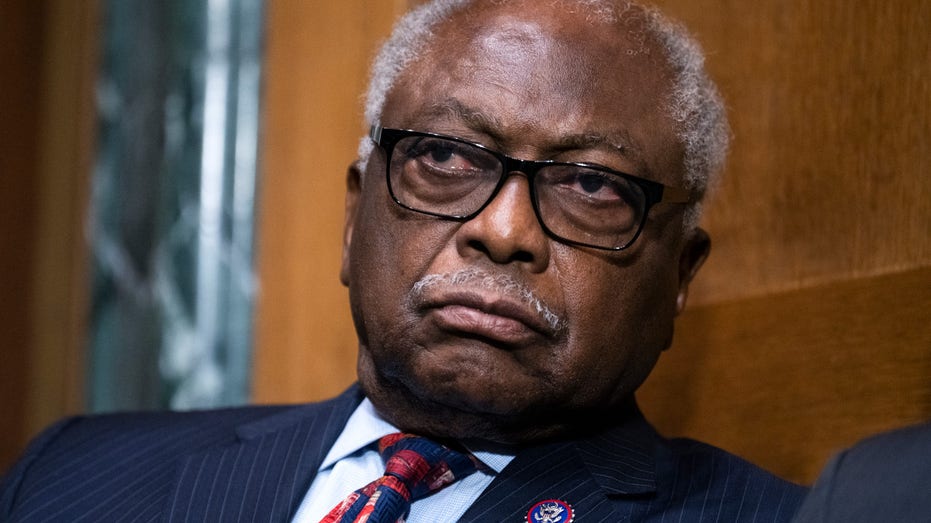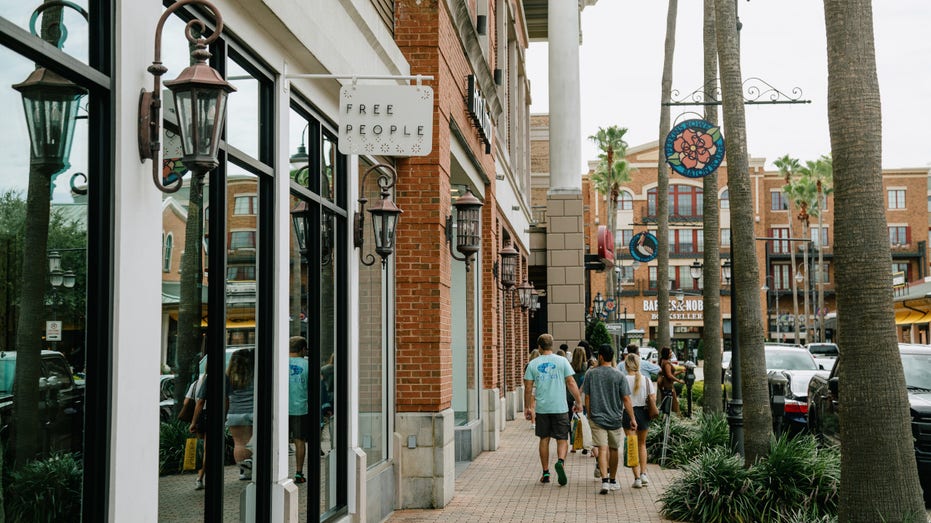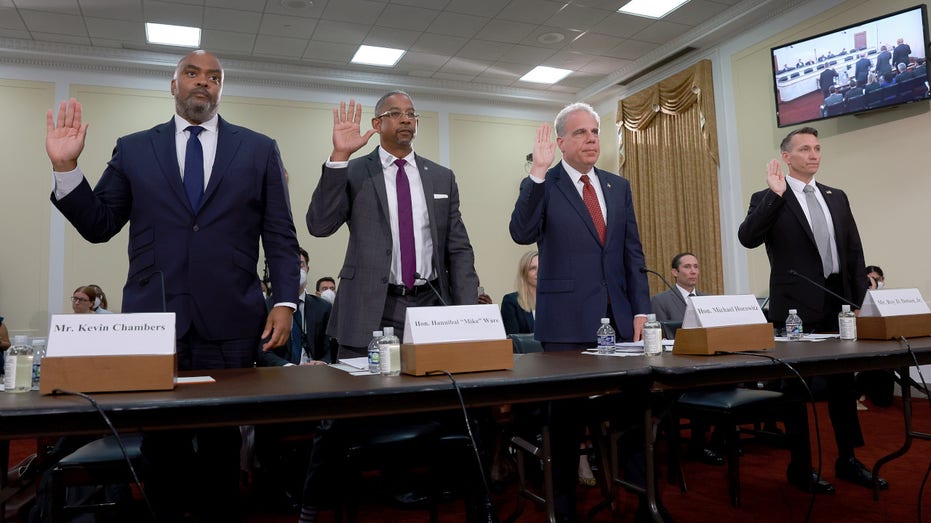Fintech companies acted with 'inexcusable misconduct,' failed to stop COVID fraud, top Dem alleges
House investigation finds fintech companies 'appear to have failed to stop obvious and preventable fraud, leading to the needless loss of taxpayer dollars'
PPP loans lost to fraud on massive scale
David Spunt reports on estimated $100 billion in fraud cases
A new government report paints a damning picture about how easy it was for taxpayer money to be fraudulently obtained through Paycheck Protection loans issued during the coronavirus pandemic.
The report, released Thursday by the House Select Subcommittee on the Coronavirus Crisis, shows multiple financial technology companies, or fintechs, were either unable or unwilling to perform checks and balances on loans being issued. The result was the approval of large numbers of fraudulent applications – and untold tens of billions of dollars meant for struggling small businesses stolen.
"Many of these companies appear to have failed to stop obvious and preventable fraud, leading to the needless loss of taxpayer dollars," the report states.
Even worse, the 120-page report suggests fintechs made billions of dollars through taxpayer reimbursed fees while telling the government it was performing due diligence on loan applicants.
COVID-19 SCAMMERS WHO FLED TO MONTENEGRO WHILE AWAITING SENTENCING EXTRADITED BACK TO US: REPORT

President Biden replaces the cap on his pen as he signs the "Paycheck Protection Program Extension Act of 2021" into law in the Oval Office at the White House in Washington, D.C., March 30, 2021. (REUTERS/Jonathan Ernst/File Photo / Reuters)
Subcommittee Chairman Rep. James Clyburn, D.S.C., said many of the fintechs acted with "inexcusable misconduct" and believes further investigative action may be warranted by the Department of Justice.
"As today’s report details, many fintechs, while promising to help disburse billions of Paycheck Protection Program [PPP] dollars to struggling small businesses efficiently and expeditiously, refused to take adequate steps to detect and prevent fraud despite their clear responsibility to safeguard taxpayer funds. Even as these companies failed in their administration of the program, they nonetheless accrued massive profits from program administration fees, much of which was pocketed by the companies’ owners and executives," Clyburn said in a statement.
"On top of the windfall obtained by enabling others to engage in PPP fraud, some of these individuals may have augmented their ill-gotten gains by engaging in PPP fraud themselves," he added.
The report singled out two "unvetted and unregulated" fintech companies, Womply and Blueacorn, that together were responsible for nearly one in every three PPP loans funded in 2021.
SBA DOLED OUT $684M IN PPP LOANS TO ‘POTENTIALLY INELIGIBLE’ NONPROFITS

House Majority Whip Jim Clyburn, D-S.C., listens to DeAndrea Gist Benjamin, of South Carolina, nominee to be U.S. Circuit Judge for the Fourth Circuit, testify during her Senate Judiciary Committee confirmation hearing on Tuesday, Nov. 15, 2022. (Tom Williams/CQ-Roll Call, Inc via Getty Images / Getty Images)
Blueacorn, a company founded during the pandemic to help small businesses access PPP loans, received more than $1 billion in taxpayer-funded processing fees but spent less than 1% of its earnings on preventing fraud, investigators found. The company also pressured employees to spend less than 30 seconds reviewing loan applications, instructing workers, "the faster the better."
The company "almost exclusively relied on third-party companies and contractors" to process PPP loan applications as well, and did not provide proper training to verify the authenticity of loan applications, the report said. Internal communications also revealed that Blueacorn's leadership turned away would-be borrowers who were eligible for PPP funding in pursuit of "monster loans [that] will get everyone paid."
Additionally, the committee said that Blueacorn founders Nathan Reis and Stephanie Hockridge received nearly $300,000 in PPP loans themselves while raking in more than $120 million in taxpayer-funded processing fees in "signs of potential fraud."
Meanwhile, Womply's CEO – who was convicted of insider trading in 2014 – was personally in charge of the company's fraud-prevention efforts and allegedly withheld information from federal PPP fraud investigators, the report said.
COVID-19 RELIEF FRAUD LED TO BILLIONS IN TAX-PAYER FUNDED PAYCHECK PROTECTION PROGRAM LOANS LOST

A Free People store at the Perkins Rowe shopping district in Baton Rouge, Louisiana, US, on Saturday, Aug. 13, 2022. Baton Rouge, Louisiana, is an example of a place where Paycheck Protection Program (PPP) loans surged in lower-income areas in 2021, (Bryan Tarnowski/Bloomberg via Getty Images)
Companies like Capital Plus, Harvest, and other fintech-partnered PPP lenders admitted to having no formal program to oversee Womply and Blueacorn's activities.
Other companies including Kabbage and Bluevine "missed clear signs of fraud in a number of PPP applications" and deflected blame for failing to stop fraud onto the Trump administration and the Small Business Authority.
"At the end of the day, it's the SBA's s---ty rules that created fraud, not [Kabbage]," the company's head of policy wrote in a September 2020 email obtained by the committee.
RAND PAUL DEMANDS SBA EXPLAIN WHY PPP MONEY WAS WRONGFULLY GIVEN TO PLANNED PARENTHOOD

Kevin Chambers, director for COVID-19 Fraud Enforcement, Department of Justice; Hannibal "Mike" Ware, inspector general, Small Business Administration; Michael Horowitz, chairman, Pandemic Response Accountability Committee; and Roy D. Dotson Jr., act (Joe Raedle/Getty Images / Getty Images)
Clyburn requested that the SBA and SBA Office of the Inspector General conduct their own investigations into waste, fraud, and abuse, and referred potential criminal conduct discovered by the committee to the Department of Justice.
The Select Subcommittee investigation reviewed more than 83,000 pages of internal documents from Kabbage, BlueVine, Cross River Bank, and Celtic Bank, Blueacorn and Womply, as well as information and documents from fintech PPP lending partners Harvest, Capital Plus, Prestamos, American Express, KServicing, Fountainhead, Benworth, Wells Fargo, Bank of America, and CDC Small Business Finance.
Watchdog groups and COVID fraud researchers say reforms are needed to ensure future emergency government programs are not as easily abused.
Bluevine told FOX Business it "appreciates the Subcommittee's inquiry into the pandemic relief program."
"We are proud to have participated in the PPP program during a time that was truly extraordinary," the company continued. "As the Subcommittee noted, all fintech companies are not the same, and Bluevine ‘adapted to the ongoing threats better’ than some of the other fintech companies examined in the inquiry. Bluevine played a unique role partnering with two licensed, SBA-lender banks to provide third-party services during the PPP. As service providers, Bluevine facilitated access to PPP loans, and provided critical aid to over 300,000 small businesses, and helped save more than 700,000 jobs, all while following evolving SBA guidance and program guidelines. Since its founding in 2013, Bluevine has remained committed to establishing and maintaining robust internal controls and governance processes. We were happy to share with the Subcommittee information about the processes and controls used to issue much-needed loans to small businesses during this unprecedented time. We are also very proud of the countless hours our employees put into executing this program and to have served thousands of small businesses and communities that were greatly impacted by the pandemic."
CLICK HERE TO READ MORE ON FOX BUSINESS





















